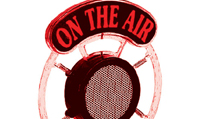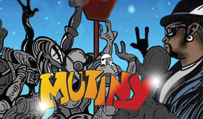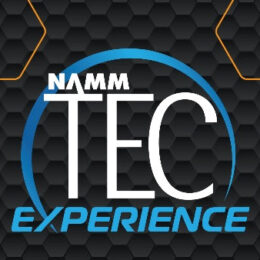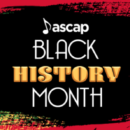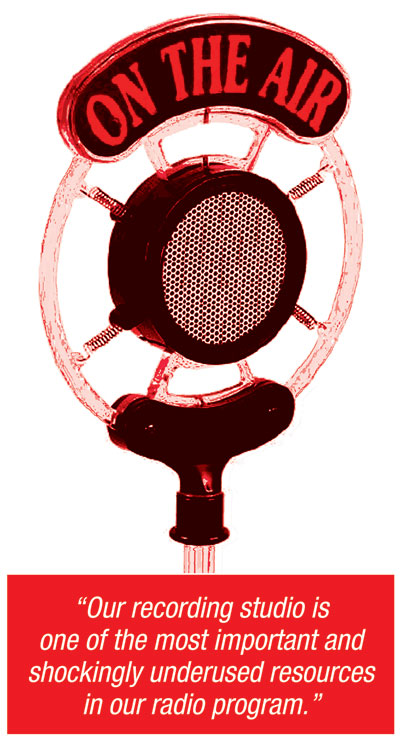 Once Upon a Time…
Once Upon a Time…
College radio used to be great. In fact, there was a time when college radio was indispensable. Thirty years ago, it was the primary resource for up-and-coming bands to gain listenership. Record labels, small to major, would scour the airwaves for potential clientele. Bands like the Smiths, R.E.M., the Replacements all got signed thanks to college radio play. Nirvana’s Nevermind couldn’t have achieved its historic No. 1 spot on the Billboard 200 if “Smells Like Teen Spirit” hadn’t first hit the college airwaves as a single. College Music Journal was an entire magazine devoted to an analysis of college radio music in the ‘80s and ‘90s. In a time before Internet, before Pitchfork, before Bandcamp, Facebook, Soundcloud or Piratebay, college radio was the frontline––the primary wave of attack for the cutting-edge music scene. Today things are, well, different. It is safe to say that the role of college radio has changed significantly. But never fear, I am here to help you navigate these changes.
My Radio Station
I am a junior at Lewis & Clark College, a small (we’re talking 2,000 undergrads), private, liberal arts college in Portland, OR. I am also a DJ and music library manager at KLC, our school’s radio station.
Every radio station at every college is a different sonic snowflake from the next. There are plenty of large, well-funded and thriving college radio stations with full-time DJs and managers on payroll. I am not talking about those stations. I want to give you an inside look into the opposite side of the spectrum: the small, underfunded and completely student-run liberal arts college radio station. Here is a secret: at our station, your best resources may have nothing to do with “radio” at all! Keep reading, I will explain.
An Inside Look: The Grim Truth
Here are a few facts you should know about my college radio station:
• Rules and regulations for DJs exist but are rarely enforced or followed.
• Most shows are not seriously themed…or taken seriously…or listened to at all for that matter.
• We have an incredibly unorganized “library” or room full of CDs and vinyl in utter disarray.
• We receive promotional/demo CDs from musicians almost every day, but have no system or process for listening to them. (They basically go into a void, an un-listened-to stack of doom.)
And most importantly:
• We are not broadcast over any FM or AM airwaves.
• We stream our shows online and do not save or archive the shows.
That’s right, our college radio is not actually on the radio. The fact is, FCC licenses are very expensive and labor-intensive for a small, student-run station to maintain. While I can’t speak for all small college stations, I certainly have friends in small schools who describe similar predicaments at their stations. I understand this may seem bleak. I mean…it kind of is.
Don’t Lose Hope!
The good news is that there are still resources at my college radio station that you can take advantage of! Like I said before, many of these opportunities have nothing to do with “radio” play at all!
1. Play At Our School
If you want a great chance to expose your music to a college campus, go play there!
Aside from radio itself, our station is in charge of bringing music to our campus for live events. We organize at least three to four live shows per semester featuring all types of music from the surrounding community as well as touring acts. We are always looking for bands and musicians to come play in some form or another. The radio station also has a budget for promoting these shows via posters and flyers; so if you play here, people will know. I guarantee you will get more exposure from actually playing on our campus than from your demo being streamed on our station.
2. Use Our Recording Studio
Our radio station also has a brand new, built-in recording studio. Straight up. We will record you or your band and we will do it for cheaper than any “professional” studio. Our recording studio is one of the most important and shockingly underused resources in our radio program. On top of this, our recording studio has a connected bandcamp page on which we will promote whatever you record for free!
3. Ask For a Review
We run a music blog tumblr webpage on which we post album and concert reviews. If you want a source of feedback from one of your most valued demographics, contact us and ask for a review. Local venues love comping tickets for college radio stations, which means we will absolutely attend and review your live show if you reach out and ask for one.
4. Beware the CD Abyss of Doom!
Unfortunately that is where your demo or EP will likely end up if you just mail it in to us. We will sooner listen to your CD if we know you or have at least had a conversation with you. Which brings me to my final point.
5. Stop By, Say Hi
This may be one of the most important tips I can offer. In fact I really can’t stress it enough. The most efficient way to make use of any of the above resources is by personal connection. Come onto campus and stop by the station. Introduce yourself to anyone and everyone. Hang out. Sit in on a show or two. This could really make all the difference
And Remember…
College student apathy is real, especially at an entirely student-run radio station. If you ask for something and don’t get an immediate response or a follow-up, ask again. I promise, it’s not that we don’t care about you or are not interested.
TED JAMISON is a DJ and music library manager at KLC in Portland, OR, where he attends Lewis & Clark College. He is an ethnomusicology major, a bass player and an aspiring music writer. Reach him at [email protected]

